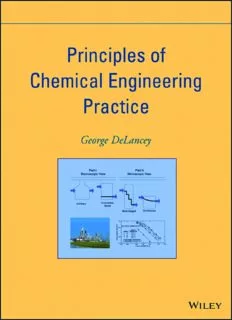Table Of ContentPRINCIPLES OF CHEMICAL
ENGINEERING PRACTICE
PRINCIPLES OF CHEMICAL
ENGINEERING PRACTICE
GEORGE DELANCEY
Cover image reprinted with permission of BASF: The Chemical Company. All rights reserved. Graph image reprinted with permission of Elsevier,
Kovenklioglu and DeLancey, 1979.
Copyright # 2013 by John Wiley & Sons, Inc. All rights reserved.
Published by John Wiley & Sons, Inc., Hoboken, New Jersey.
Published simultaneously in Canada.
No part of this publication may be reproduced, stored in a retrieval system, or transmitted in any form or by any means, electronic, mechanical, photocopying,
recording, scanning, or otherwise, except as permitted under Section 107 or 108 of the 1976 United States Copyright Act, without either the prior written
permission of the Publisher, or authorization through payment of the appropriate per-copy fee to the Copyright Clearance Center, Inc., 222 Rosewood Drive,
Danvers, MA 01923, (978) 750-8400, fax (978) 750-4470, or on the web at www.copyright.com. Requests to the Publisher for permission should be
addressed to the Permissions Department, John Wiley & Sons, Inc., 111 River Street, Hoboken, NJ 07030, (201) 748-6011, fax (201) 748-6008, or online
at http://www.wiley.com/go/permission.
Limit of Liability/Disclaimer of Warranty: While the publisher and author have used their best efforts in preparing this book, they make no representations or
warranties with respect to the accuracy or completeness of the contents of this book and specifically disclaim any implied warranties of merchantability or
fitness for a particular purpose. No warranty may be created or extended by sales representatives or written sales materials. The advice and strategies
contained herein may not be suitable for your situation. You should consult with a professional where appropriate. Neither the publisher nor author shall be
liable for any loss of profit or any other commercial damages, including but not limited to special, incidental, consequential, or other damages.
For general information on our other products and services or for technical support, please contact our Customer Care Department within the United States
at (800) 762-2974, outside the United States at (317) 572-3993 or fax (317) 572-4002.
Wiley also publishes its books in a variety of electronic formats. Some content that appears in print may not be available in electronic formats. For more
information about Wiley products, visit our web site at www.wiley.com.
LibraryofCongressCataloging-in-PublicationData:
DeLancey,George,1940-
Principlesofchemicalengineeringpractice/GeorgeDeLancey.
pagescm
Includesindex.
ISBN978-0-470-53674-2(hardback)
1. Chemicalengineering. I.Title.
TP155.D4252012
660–dc23
2012047056
PrintedintheUnitedStatesofAmerica
10 9 8 7 6 5 4 3 2 1
Thisbookisdedicatedtomydarlingwife,Lynn,whonurturedeverypageandeverymomentwithhergenerosity,
encouragement,andunfalteringsupport.
CONTENTS
PREFACE xix
PARTI MACROSCOPICVIEW 1
1 ChemicalProcessPerspective 3
1.1 SomeBasicConceptsinChemicalProcessing, 3
1.2 AcrylicAcidProduction, 5
1.2.1 Catalysis, 7
1.2.2 FeedSection—PumpsandCompressors, 8
1.2.3 ReactorSection—Reactor,HeatExchangers,andGasAbsorption, 12
1.2.4 DownstreamProcessing—DistillationandExtraction, 16
1.2.5 Storage, 19
1.2.6 Safety, 20
1.2.7 OverviewofTypicalProcess, 20
1.3 BiocatalyticProcesses—EnzymaticSystems, 21
1.3.1 Biotransformation, 22
1.3.2 ExamplesofIndustrialProcesses, 23
1.3.3 AlkylGlucosides, 23
1.4 BasicDatabase, 24
Problems, 26
2 MacroscopicMassBalances 28
2.1 ChemicalProcessingSystems, 28
Example2.1-1:ActiveUnitsinAcrylicAcidSeparationTrain, 29
2.1.1 InputandOutputRatesofFlow, 29
2.1.1.1 SomeEquationsofState, 31
Example2.1.1.1-1:CalculatetheMolarVolume
ofMethaneat(cid:1)250(cid:3)F, 32
2.1.1.2 MassRateofProduction, 36
vii
viii CONTENTS
2.2 Steady-StateMassBalancesWithoutChemicalReactions, 37
2.2.1 DegreesofFreedom, 37
Example2.2.1-1:ManufactureofSugar, 39
Example2.2.1-2:AirSeparationPlant, 40
2.3 Steady-StateMassBalanceswithSingleChemicalReactions, 41
2.3.1 DegreesofFreedom:ReactionRateandKeyComponent, 42
Example2.3.1-1:ProductionofFormaldehyde, 42
Example2.3.1-2:ManufactureofNitroglycerin, 44
2.4 Steady-StateMassBalanceswithMultipleChemicalReactions, 46
2.4.1 DegreesofFreedomandReactionExtents, 46
Example2.4.1-1:MassBalanceonAcrylicAcidReactorR-301, 46
2.4.2 TestforIndependentReactions, 47
Example2.4.2-1:IndependentReactionsintheAcrylicAcidSystem, 47
Example2.4.2-2:SelectionofIndependentReactions, 48
2.4.3 ConstructionofIndependentReactions, 48
Example2.4.3-1:IndependentReactionsintheAcrylicAcidSystem, 49
Problems, 50
3 MacroscopicEnergyandEntropyBalances 53
3.1 BasicThermodynamicFunctions, 53
3.1.1.1 Gibbs–DuhemEquation, 55
3.2 EvaluationofHandSforPureMaterials, 55
3.2.1 Gases—DepartureFunctions, 55
Example3.2.1-1:DepartureFunctionsforHandSUsingtheRedlich–Kwong–
Soave(RKS)EquationofState, 57
Example3.2.1-2:EvaluationofanEnthalpyChangeforEthylene, 57
3.2.2 LiquidsandSolids, 58
Example3.2.2-1:EnthalpyChangeintheInjectionMoldingof
Polystyrene, 59
3.3 EvaluationofHandSFunctionsforMixtures, 59
3.3.1 IdealGasMixture, 59
3.3.2 IdealSolution, 60
3.3.3 NonidealGasMixtures, 60
3.3.4 NonidealLiquidSolutions:HeatofSolution, 60
Example3.3.4-1:PartialMolarEnthalpiesforHCl–WaterSystem, 62
3.4 EnergyFlowsandtheFirstLaw, 62
3.4.1 DegreesofFreedom, 63
3.5 EnergyBalancesWithoutReaction, 64
3.5.1 UtilizationoftheSecondLaw, 64
Example3.5.1-1:MinimumWorkRequiredforIsothermalPumping
ofaLiquid, 64
3.5.2 SystemDefinitionforDutyandFlowRateCalculation, 64
Example3.5.2-1:CalculationofHeatDutyandStreamFlowRatefor
ExchangerE-309, 65
3.5.3 ArbitrarinessofReferenceStateforUnreactiveSystems, 66
Example3.5.3-1:EnergyBalanceonT-303ExtractionUnit.FeedReference
State, 66
Example3.5.3-2:CalculationofNetHeatDutyforDistillationTowerT-304.
FeedReferenceState, 67
Description:Enables chemical engineering students to bridge theory and practice Integrating scientific principles with practical engineering experience, this text enables readers to master the fundamentals of chemical processing and apply their knowledge of such topics as material and energy balances, transport

